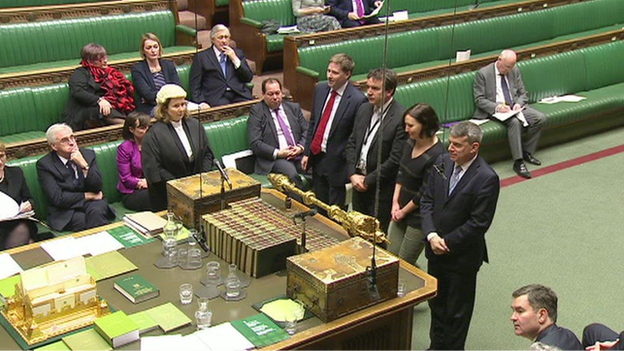Wales Bill 'not the end of the story', says ex-minister
- Published
- comments

The last vote on what will become the Wales Act 2017.
It was said to offer a "once-in-a-generation opportunity to draw a line under this ongoing, endless debate that we seem to have in Wales about devolution and further powers".
The aim was "a lasting and fair devolution settlement for Wales", external. David Cameron (remember him) talked of "an enduring settlement for Wales which works for Wales today, tomorrow and for generations to come"., external
That was then. On Monday night, the product of those dreams - the Wales Bill - cleared its passage through parliament. How does it measure up to its original lofty aims?
'Interesting chapter'
The driving force behind the changes, Stephen Crabb, offered his assessment as MPs concluded their debates: "To be absolutely honest, I do not think that this represents the end of the book on Welsh devolution, but we need a prolonged period in which the Welsh government learn to deploy their powers and use their competencies in a way that benefits the people of Wales."
He added: "It is not the end of the story, but I hope that it is the end of an interesting chapter for Welsh devolution."
Montgomeryshire Conservative MP Glyn Davies broke with convention to speak on the Bill - ministerial aides or parliamentary private secretaries do not usually speak in their bosses' area of responsibility.
'Dogged'
He said: "As someone who served as a member of the National Assembly for Wales for eight years before my six years here, almost all of my political life has been dogged - if I can use that word - by Wales Bills of one sort or another.
"I do not know whether I will still be a Member of this Parliament when the next round comes but, as Stephen Crabb said, I am sure that there will be one."
So the Bill may not have succeeded in drawing a line under the constitutional arguments, although MPs did largely find other things to talk about during Welsh Questions, external in the Commons on Wednesday.
Brexit, inevitably, dominated with MPs raising the future of farming and automotive industries.
Labour raised fears that Brexit could mean higher water prices if the UK government won't protect EIB lower cost loans (Welsh Water having received a loan from the EIB, external).
Wales Office Minister Guto Bebb told her: "The key point that you must be aware of is that thus far, this government have delivered a degree of protection for EU funding in Wales, and in due course further announcements will be made about further funding support in a Welsh context."
'Trucks'
Stephen Crabb raised the impact of Brexit on border and customs controls between the UK and Ireland (or the continuing EU). He asked his successor Alun Cairns to "get really involved" in talks to "protect Welsh interests by minimising checks and delays on trucks that use Welsh ports".
His successor, Alun Cairns told him: "As we negotiate our exit from the European Union, and the special situation between Northern Ireland and the Republic of Ireland, the Welsh situation is not being ignored.
"At every Joint Ministerial Committee, external it has been recognised not only by the secretary of state for exiting the European Union [David Davis], but at the Joint Ministerial Committee involving the prime minister."
We can expect it to feature when the JMC next gathers, on Monday, in a meeting Theresa May says she will be attending.